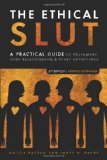I am leading a read-through of the Ethical Slut, 2nd edition. If you’d like to catch up on past installments, check the list at the bottom of the series introduction. Comments on the topics in this discussion are welcome anytime, even from people who aren’t following along in the book.
In this installment we discuss CHAPTER 7, “Abundance”
“We think … that if you loosen the possessive grip on the love that’s already yours, you’ll get more, from the person who loves you, and maybe from other people too. It certainly has worked for us. But, especially in the beginning, letting go of starvation economies can feel a lot like flying on a trapeze: you have to let go of the security you already have, trusting that at the end of the leap there will always be something else to catch you.” –from The Ethical Slut

This chapter marks the beginning of the second part of The Ethical Slut, “The Practice of Sluthood.” Although the title of this chapter is “Abundance,” it’s not so much about the ways we can achieve an abundance of love but about the fears and cultural programming which may make us feel like abundance is impossible to achieve. Chapter 7 of the second edition is very similar to a chapter called “Slut Economies” in the original edition.
Starvation economies are the major topic here — the idea that there is not enough to go around, and that we all must compete to lay claim on the love, sex partners, and other pleasurable resources before other people snatch them up and there’s none left for us. We are of course inundated with this idea by the media — it’s at the heart of the classic, oft-repeated love triangle scenario, where two people compete over the love of one other who of course is not allowed to choose them both! I don’t object to seeing this in stories, because I know it’s the reality many people choose to live in. I can even enjoy a well-written love triangle, but at other times it will have me beating my head against a wall in frustration at the lengths people will go to in order to claim a person as their “only.”
But one thing this chapter got me thinking about was the way even polyamorous people need to examine their behavior for the ways that starvation responses creep in. All of us in our relationships make different agreements — even if we’re not wise and open enough to discuss them openly, certain assumptions get made (which are often the source of disagreements later). Every relationship should of course figure out what makes the participants in it comfortable — there are many things that some people agree to happily and find it gives them a lot of security that would drive me crazy. If it works for you, I think it’s great. Yet other agreements seem to become artificial restrictions, guarding against irrational fears which when unpacked are not really in need of protection against.

I know there is more coverage of agreements later in the book, but one which I found myself thinking about, and which relates to the topic of abundance, is the concept of “firsts.” A lot of times in relationships it seems like we make many requests like “I’d like to be the first to use that toy together,” or “I want to be the first to tie you to a cross,” to use two kinky examples. Others might be “Let me be the first person you fuck today and then you can do anything you want.”
On the one hand these kinds of agreements can give comfort when they’re met. But on the other, circumstances can interfere with our desires — it’s one thing if a partner develops a pattern of ignoring our requests, but it’s also a problem to treat small disappointments like unforgivable offenses. I’ve been on both sides of this one and it’s easy to lose sight of perspective: in a long-term relationship, does it really matter if I’m the first person you fuck today, or the first person you do some specific act with at all, when we have potentially years of pleasurable, erotic encounters of all kinds stretching before us? The next chapter of this book is about Slut Skills, but I’m going to go ahead and say right now that forgiveness is a valuable skill in any relationship, but often in open ones.
Chapter 7 spends some time discussing physical possessions and how it’s important to understand when to share them. I’ve had lovers leave pillows at my house, for example, and I try to make sure that other lovers of mine don’t use them when they spend the night. Pet and I have some fancy rope by Boss Bondage which she bought for me to use on her, and that I can’t use on others without her permission.
Of course, bringing BDSM into any discussion of starvation economies and possessiveness complicates things because many kinksters consensually treat people as possessions in a way that others might not (or do not do so consciously anyway, a topic for another day). For me, possession is a fluid thing — I can enjoy claiming a person in the moment and then find sharing them just as enjoyable later. When I grab a submissive by the hair and growl “mine” in their ear, I mean they’re mine right now — that I want him or her so badly in that moment that I have to lay claim to every inch of them. We can, I think, belong to many people, and find that comforting and good, just as in another sense I belong to both the kink community and Burner community in my town.

Even polyamorous kinksters may find taking on certain limits comforting and pleasurable, when it works for both parties involved. My pet generally doesn’t want to play with anyone else unless her ‘Daddy’ is there, and on FetLife other Dominants are required to get in touch with me first before they initiate communication with her. But these agreements are in place because they make Pet feel safe, secure and loved. This kind of possession can paradoxically be liberating, because it frees a person by letting them know where to stand, and giving them a sense of acting under the protection of their Dominant. Though she is my possession, if ever she wanted to be someone else’s too our relationship would adapt.
Yet I have also encountered kinksters who seem to view polyamory as a way to reinforce their fears of a starvation economy. These are the Dominants of any gender who want to lay claim to a harem full of subs and then greatly restrict their behavior with others. These are the people who seem to believe that it’s impossible to truly submit to more than person, regardless of what one might choose to do. The flamewars between these two outlooks are frequent, because in the end what each is doing is actually a fundamentally different thing — not really both the same polyamory even if both involve group relationships. In the end though, I don’t feel comfortable when kink is used to reinforce starvation economies, as it tends to make us sluts (and everyone?) lose out.
Overall I really liked this chapter. In particular I appreciated the discussion of sexual economies — or “the tyranny of hydraulics.” While I’m someone with a fairly large sexual stamina, able to have multiple orgasms in a day and with a high interest in sensuality and the pleasure of my partners regardless of the state of my penis, there have still been times when I’ve struggled in my relationships to keep a healthy outlook on what I’m doing. At one time my Pet and I seemed to have developed an unhealthy, rigid focus on penis-in-vagina penetrative sex and for various reasons I am having trouble even recalling now, it had become psychologically loaded to the point where I had difficulty performing. There was some discomfort in proposing we remove penetrative intercourse from our sexual repertoire for a while, especially because we knew I was still doing that with other lovers. Yet taking the time to focus on “outercourse” and other forms of pleasure really helped deepen the pleasure that she and I share, and now we have a much more healthy, well-rounded sex life that includes many kinds of sex including that one.
Let’s talk about how we’ve navigated the sexual economies in our lives. How have you negotiated others’ fears of starvation? Have you found abundance in letting go of these old myths? Like the authors, I believe I have.
This read-along will continue on Thursday, February 17 with Chapter 8, “Slut Skills.”